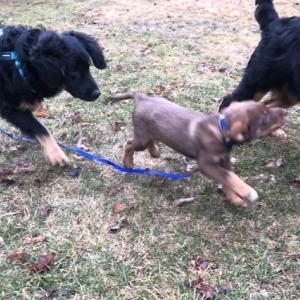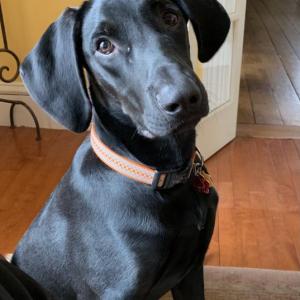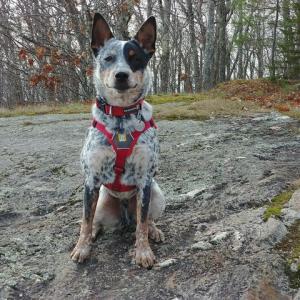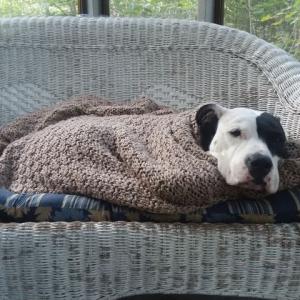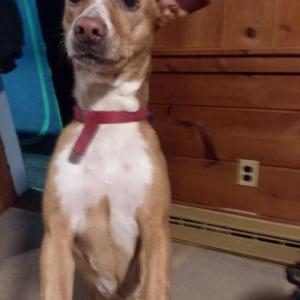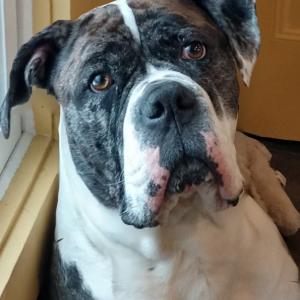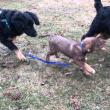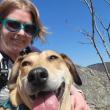Welcome to Maine, you fine, furry friends

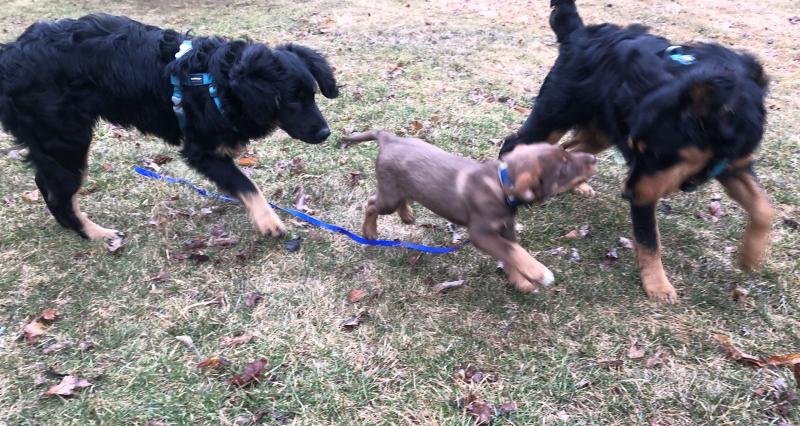 Sam and Goose and Pippin all arrived via a rescue van this past winter and early spring from Mississippi and love living in Maine.
Sam and Goose and Pippin all arrived via a rescue van this past winter and early spring from Mississippi and love living in Maine.
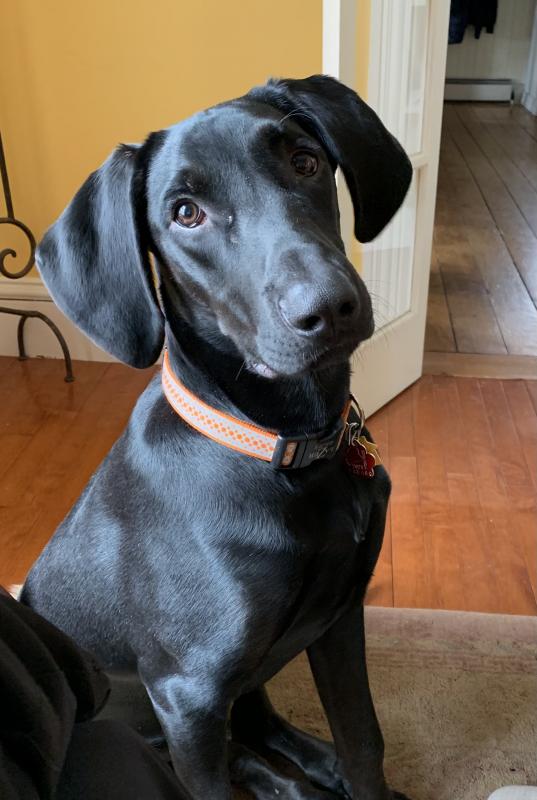 Hello I’m Walter. I’m 11 months old and love to run, wrestle, sniff and devour any stick that comes my way. Half lab /half hound – Who knows! I came from Mississippi, but Maine is a great place to live now with my adopted family. Maybe I’ll see you at the dog park in Camden.
Hello I’m Walter. I’m 11 months old and love to run, wrestle, sniff and devour any stick that comes my way. Half lab /half hound – Who knows! I came from Mississippi, but Maine is a great place to live now with my adopted family. Maybe I’ll see you at the dog park in Camden.
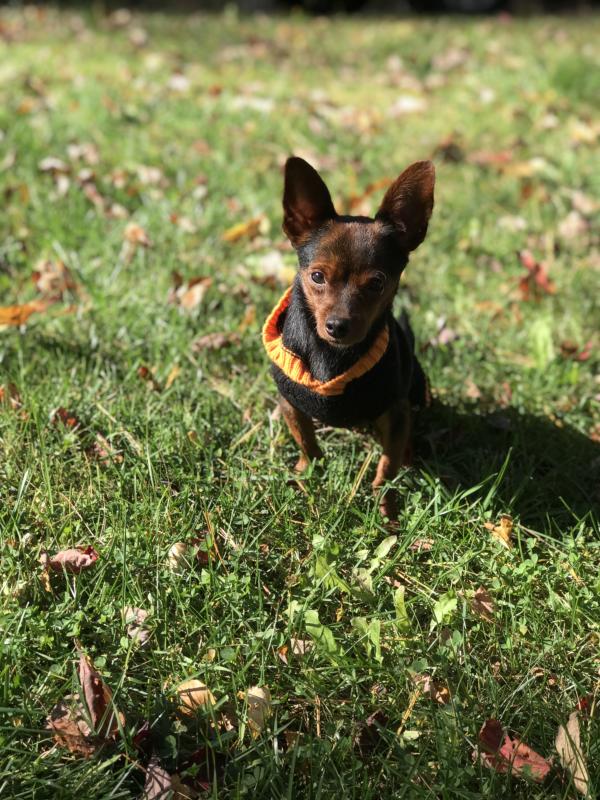 Percy was adopted a little over a year ago from PAWS in Camden. He arrived from a rescue in Texas called Sweetpups that works with PAWS to re-home southern dogs. “Originally we were to foster Percy, but he got also along so well with our other dog, who was also a rescue through PAWS from Texas, that we welcomed him into our family,” said Heather Forcillo. “He has a huge personality packed into a seven-pound body and he loves any adventure in any weather! PAWS was wonderful to work with and their staff was very accommodating and helpful.”
Percy was adopted a little over a year ago from PAWS in Camden. He arrived from a rescue in Texas called Sweetpups that works with PAWS to re-home southern dogs. “Originally we were to foster Percy, but he got also along so well with our other dog, who was also a rescue through PAWS from Texas, that we welcomed him into our family,” said Heather Forcillo. “He has a huge personality packed into a seven-pound body and he loves any adventure in any weather! PAWS was wonderful to work with and their staff was very accommodating and helpful.”
 Cootie, a Jack Russell and dachshund mix, was adopted by Peggy Jones East in November 2020. Cootie had been transported north from South Carolina.
Cootie, a Jack Russell and dachshund mix, was adopted by Peggy Jones East in November 2020. Cootie had been transported north from South Carolina.
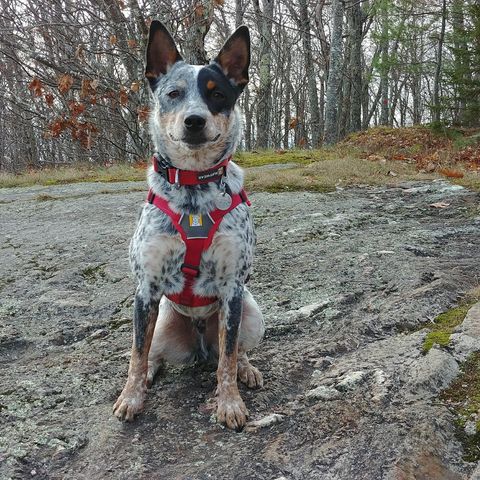 “Ace,” said Robin Harlow. “Best dog evah!” Ace was adopted four years ago, arriving in Maine from Mississippi, a rescue.
“Ace,” said Robin Harlow. “Best dog evah!” Ace was adopted four years ago, arriving in Maine from Mississippi, a rescue.
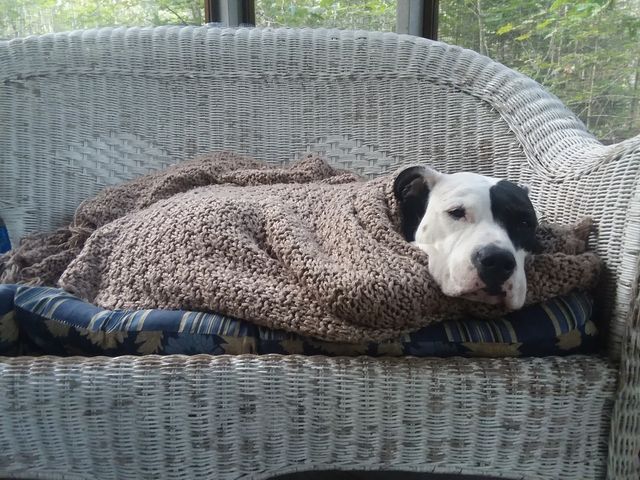 Blackie arrived in Maine with his companion, Penit. They both came from All Satos Rescue, based in Somerville, Mass., and which rescues dogs from Puerto Rico. They were transported to Biddeford, where Charlene Bailey met them. All Satos saves the street dogs of Puerto Rico, sending them north “when the going gets ruff.”
Blackie arrived in Maine with his companion, Penit. They both came from All Satos Rescue, based in Somerville, Mass., and which rescues dogs from Puerto Rico. They were transported to Biddeford, where Charlene Bailey met them. All Satos saves the street dogs of Puerto Rico, sending them north “when the going gets ruff.”
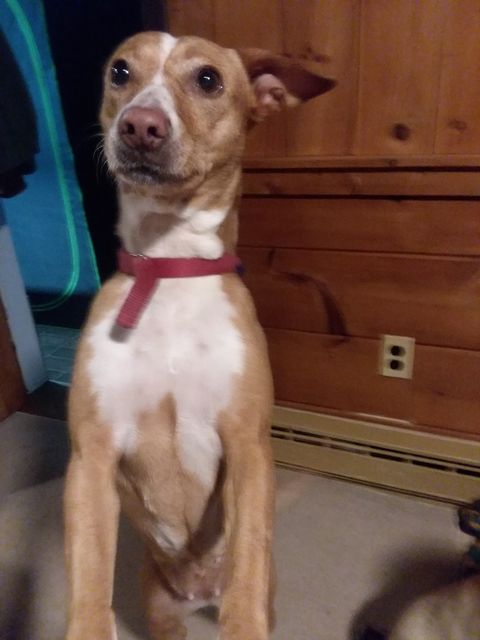 Penit, companion of Blackie. (See above).
Penit, companion of Blackie. (See above).
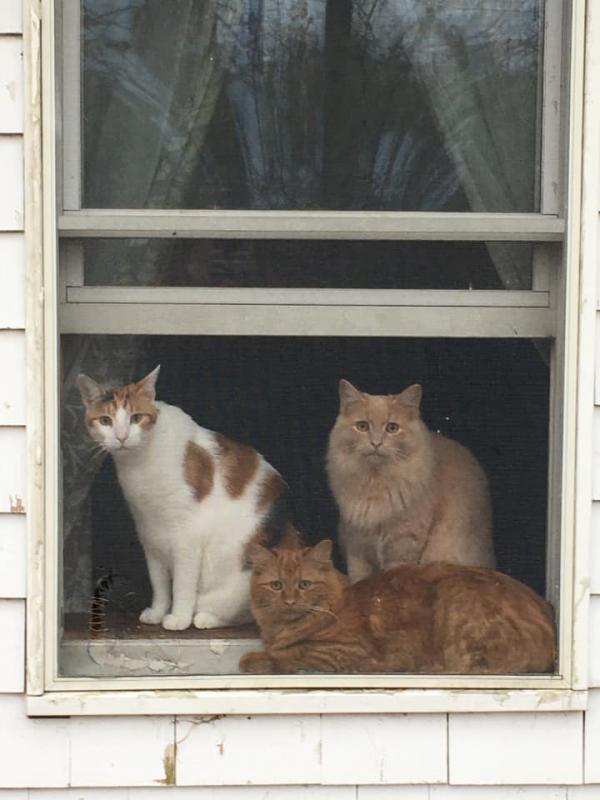 Calico, Maya was rescued from the Bahamas and adopted in October 2019. The orange is Clementine and the buff is Huckleberry. “They were litter mates we fostered early in the pandemic and adopted in May 2020,” said Shannon Bullis Burns, who, with her husband B.J., and their girls Karis and Lauren, adopted them. “This photo is from the fall. Huck is bigger than Maya now.”
Calico, Maya was rescued from the Bahamas and adopted in October 2019. The orange is Clementine and the buff is Huckleberry. “They were litter mates we fostered early in the pandemic and adopted in May 2020,” said Shannon Bullis Burns, who, with her husband B.J., and their girls Karis and Lauren, adopted them. “This photo is from the fall. Huck is bigger than Maya now.”
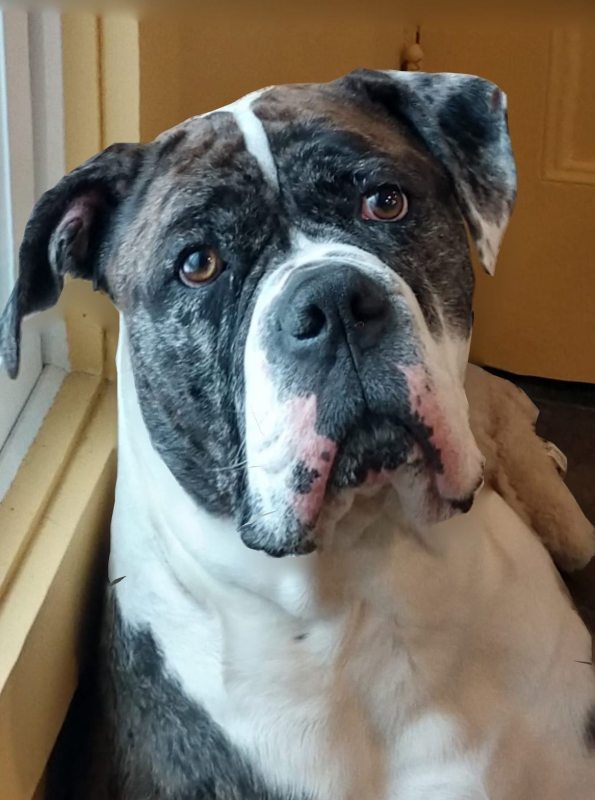 This is Jack, a 4-year-old, 100-pound Alapaha Blue Blood Bulldog. Said Seth Thayer: “We found him on Facebook and drove to Ohio to pick him up. We have a 5-year-old rescue Alapaha, as well, who has been with us for two years already and we knew we wanted another dog of the same breed. Jack lived most of his life in a crate for 12 hours a day while his humans were at work. The crate was too small and his hips never developed properly. Jack loves it in Maine. He gets to be with his humans most hours of the day, is never in a crate, and loves to swim! Jack is our third Alapaha Blue Blood Bulldog rescue, having four or first one at PAWS in Camden about 10 years ago.”
This is Jack, a 4-year-old, 100-pound Alapaha Blue Blood Bulldog. Said Seth Thayer: “We found him on Facebook and drove to Ohio to pick him up. We have a 5-year-old rescue Alapaha, as well, who has been with us for two years already and we knew we wanted another dog of the same breed. Jack lived most of his life in a crate for 12 hours a day while his humans were at work. The crate was too small and his hips never developed properly. Jack loves it in Maine. He gets to be with his humans most hours of the day, is never in a crate, and loves to swim! Jack is our third Alapaha Blue Blood Bulldog rescue, having four or first one at PAWS in Camden about 10 years ago.”
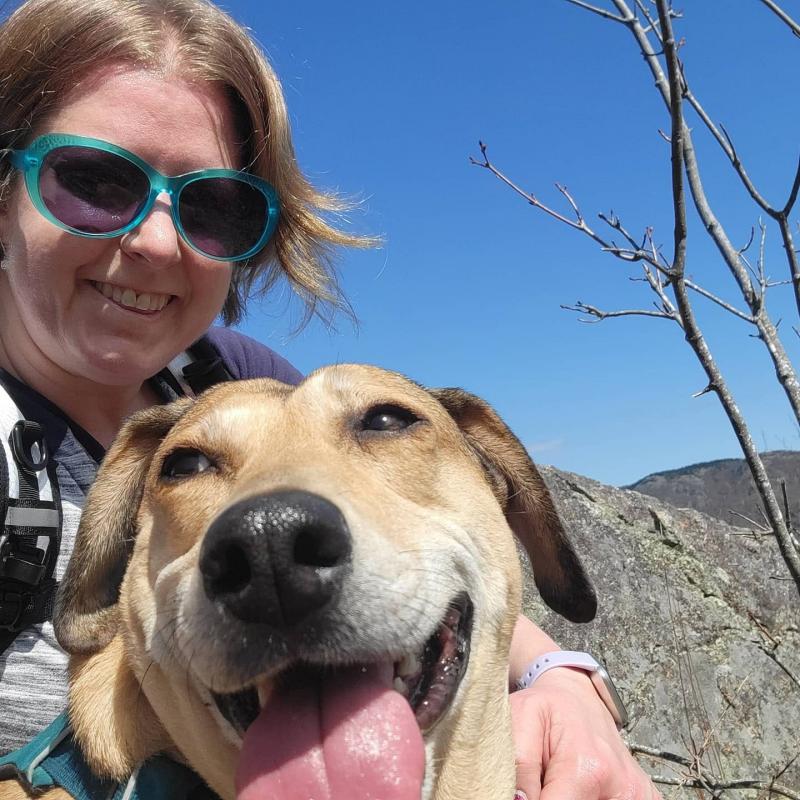 “We adopted our first dog in 13 years from Pope Memorial Humane Society,” said Kate Moody Marchessault “Maddie had been adopted from Pope two years ago (originally from South Carolina) and was surrendered back due to human health issues. We applied for a small dog, and she was the smallest they had at the time. We needed a dog that would not try to eat our rabbit, and would tolerate our cat. Maddie has been perfect. She is shy, quiet, somewhat lazy, and generally well behaved. We found through chance that she loves hiking, so I take her ad often as I can. She has been a blessing to our family especially during Covid.”
“We adopted our first dog in 13 years from Pope Memorial Humane Society,” said Kate Moody Marchessault “Maddie had been adopted from Pope two years ago (originally from South Carolina) and was surrendered back due to human health issues. We applied for a small dog, and she was the smallest they had at the time. We needed a dog that would not try to eat our rabbit, and would tolerate our cat. Maddie has been perfect. She is shy, quiet, somewhat lazy, and generally well behaved. We found through chance that she loves hiking, so I take her ad often as I can. She has been a blessing to our family especially during Covid.”
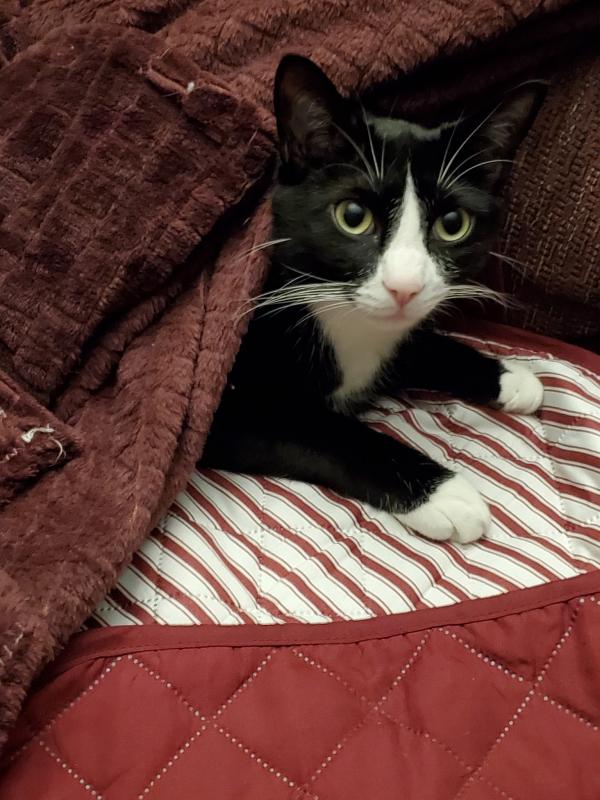 “A little over a year ago, our kitten Bruin came to us from Southern Pup in Mississippi, via 3DogsRescue in Southern Maine, as did our pup Indy back in 2016,” said Linda Lorenzen.
“A little over a year ago, our kitten Bruin came to us from Southern Pup in Mississippi, via 3DogsRescue in Southern Maine, as did our pup Indy back in 2016,” said Linda Lorenzen.
 “It has been a little more than a year,” said Lisbeth Whitney. “Louise was in a kill shelter outside of Houston, Texas, along with some of her litter mates. She was on death row as a 4 month old puppy when a Texas rescue picked her up along with her litter mates and brought them to PAWS. She is the smartest, friendliest dog we have ever had and her disposition is always sunny! She has me laughing every single day.”
“It has been a little more than a year,” said Lisbeth Whitney. “Louise was in a kill shelter outside of Houston, Texas, along with some of her litter mates. She was on death row as a 4 month old puppy when a Texas rescue picked her up along with her litter mates and brought them to PAWS. She is the smartest, friendliest dog we have ever had and her disposition is always sunny! She has me laughing every single day.”
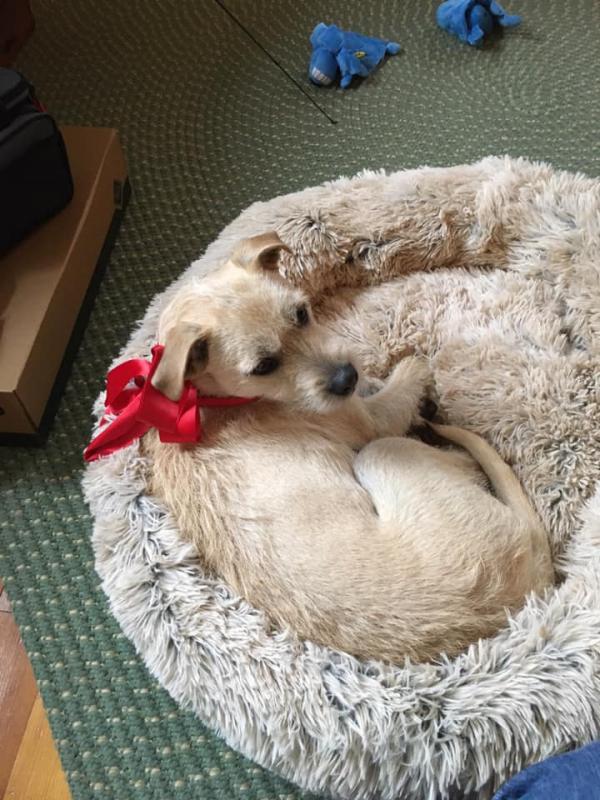 “We have Izzie,” said Anne Edmands. “She came from Texas through PAWs!”
“We have Izzie,” said Anne Edmands. “She came from Texas through PAWs!”
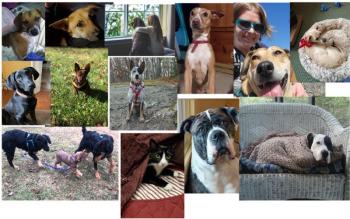
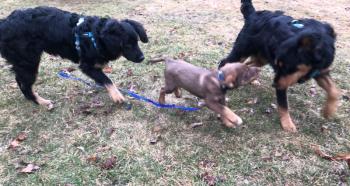 Sam and Goose and Pippin all arrived via a rescue van this past winter and early spring from Mississippi and love living in Maine.
Sam and Goose and Pippin all arrived via a rescue van this past winter and early spring from Mississippi and love living in Maine.
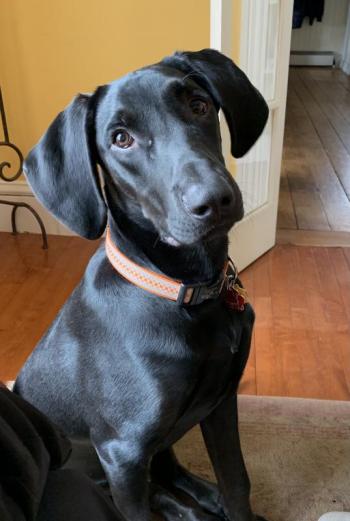 Hello I’m Walter. I’m 11 months old and love to run, wrestle, sniff and devour any stick that comes my way. Half lab /half hound – Who knows! I came from Mississippi, but Maine is a great place to live now with my adopted family. Maybe I’ll see you at the dog park in Camden.
Hello I’m Walter. I’m 11 months old and love to run, wrestle, sniff and devour any stick that comes my way. Half lab /half hound – Who knows! I came from Mississippi, but Maine is a great place to live now with my adopted family. Maybe I’ll see you at the dog park in Camden.
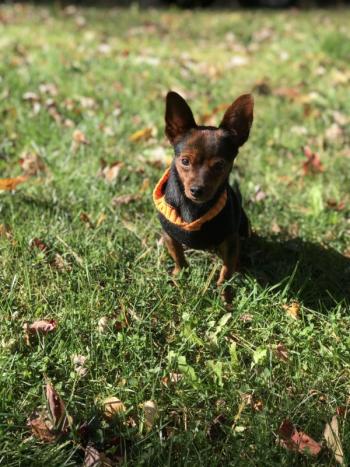 Percy was adopted a little over a year ago from PAWS in Camden. He arrived from a rescue in Texas called Sweetpups that works with PAWS to re-home southern dogs. “Originally we were to foster Percy, but he got also along so well with our other dog, who was also a rescue through PAWS from Texas, that we welcomed him into our family,” said Heather Forcillo. “He has a huge personality packed into a seven-pound body and he loves any adventure in any weather! PAWS was wonderful to work with and their staff was very accommodating and helpful.”
Percy was adopted a little over a year ago from PAWS in Camden. He arrived from a rescue in Texas called Sweetpups that works with PAWS to re-home southern dogs. “Originally we were to foster Percy, but he got also along so well with our other dog, who was also a rescue through PAWS from Texas, that we welcomed him into our family,” said Heather Forcillo. “He has a huge personality packed into a seven-pound body and he loves any adventure in any weather! PAWS was wonderful to work with and their staff was very accommodating and helpful.”
 Cootie, a Jack Russell and dachshund mix, was adopted by Peggy Jones East in November 2020. Cootie had been transported north from South Carolina.
Cootie, a Jack Russell and dachshund mix, was adopted by Peggy Jones East in November 2020. Cootie had been transported north from South Carolina.
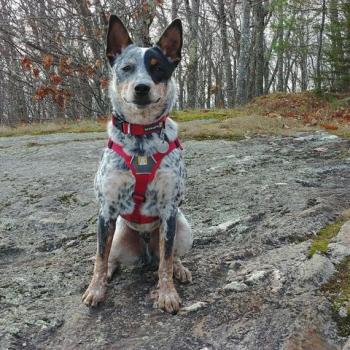 “Ace,” said Robin Harlow. “Best dog evah!” Ace was adopted four years ago, arriving in Maine from Mississippi, a rescue.
“Ace,” said Robin Harlow. “Best dog evah!” Ace was adopted four years ago, arriving in Maine from Mississippi, a rescue.
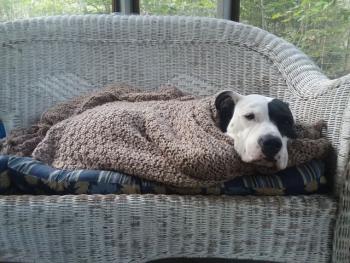 Blackie arrived in Maine with his companion, Penit. They both came from All Satos Rescue, based in Somerville, Mass., and which rescues dogs from Puerto Rico. They were transported to Biddeford, where Charlene Bailey met them. All Satos saves the street dogs of Puerto Rico, sending them north “when the going gets ruff.”
Blackie arrived in Maine with his companion, Penit. They both came from All Satos Rescue, based in Somerville, Mass., and which rescues dogs from Puerto Rico. They were transported to Biddeford, where Charlene Bailey met them. All Satos saves the street dogs of Puerto Rico, sending them north “when the going gets ruff.”
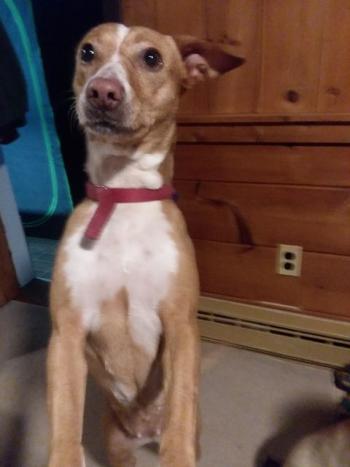 Penit, companion of Blackie. (See above).
Penit, companion of Blackie. (See above).
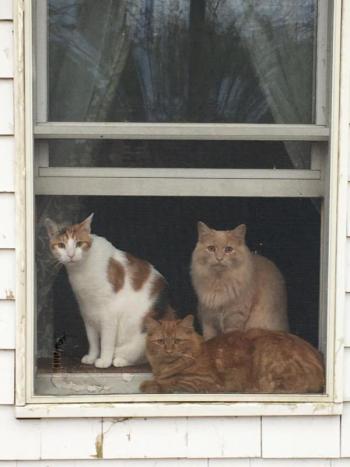 Calico, Maya was rescued from the Bahamas and adopted in October 2019. The orange is Clementine and the buff is Huckleberry. “They were litter mates we fostered early in the pandemic and adopted in May 2020,” said Shannon Bullis Burns, who, with her husband B.J., and their girls Karis and Lauren, adopted them. “This photo is from the fall. Huck is bigger than Maya now.”
Calico, Maya was rescued from the Bahamas and adopted in October 2019. The orange is Clementine and the buff is Huckleberry. “They were litter mates we fostered early in the pandemic and adopted in May 2020,” said Shannon Bullis Burns, who, with her husband B.J., and their girls Karis and Lauren, adopted them. “This photo is from the fall. Huck is bigger than Maya now.”
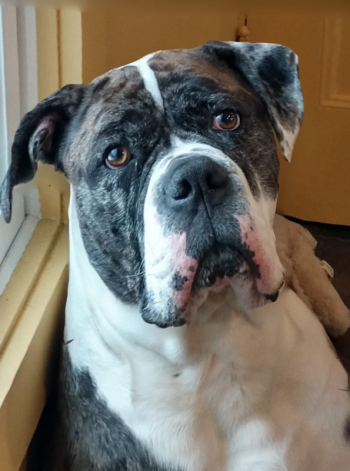 This is Jack, a 4-year-old, 100-pound Alapaha Blue Blood Bulldog. Said Seth Thayer: “We found him on Facebook and drove to Ohio to pick him up. We have a 5-year-old rescue Alapaha, as well, who has been with us for two years already and we knew we wanted another dog of the same breed. Jack lived most of his life in a crate for 12 hours a day while his humans were at work. The crate was too small and his hips never developed properly. Jack loves it in Maine. He gets to be with his humans most hours of the day, is never in a crate, and loves to swim! Jack is our third Alapaha Blue Blood Bulldog rescue, having four or first one at PAWS in Camden about 10 years ago.”
This is Jack, a 4-year-old, 100-pound Alapaha Blue Blood Bulldog. Said Seth Thayer: “We found him on Facebook and drove to Ohio to pick him up. We have a 5-year-old rescue Alapaha, as well, who has been with us for two years already and we knew we wanted another dog of the same breed. Jack lived most of his life in a crate for 12 hours a day while his humans were at work. The crate was too small and his hips never developed properly. Jack loves it in Maine. He gets to be with his humans most hours of the day, is never in a crate, and loves to swim! Jack is our third Alapaha Blue Blood Bulldog rescue, having four or first one at PAWS in Camden about 10 years ago.”
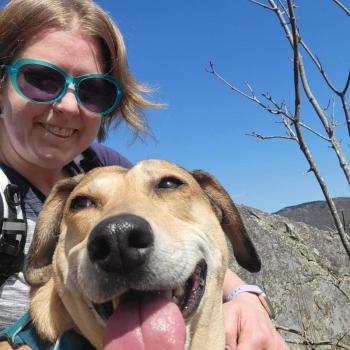 “We adopted our first dog in 13 years from Pope Memorial Humane Society,” said Kate Moody Marchessault “Maddie had been adopted from Pope two years ago (originally from South Carolina) and was surrendered back due to human health issues. We applied for a small dog, and she was the smallest they had at the time. We needed a dog that would not try to eat our rabbit, and would tolerate our cat. Maddie has been perfect. She is shy, quiet, somewhat lazy, and generally well behaved. We found through chance that she loves hiking, so I take her ad often as I can. She has been a blessing to our family especially during Covid.”
“We adopted our first dog in 13 years from Pope Memorial Humane Society,” said Kate Moody Marchessault “Maddie had been adopted from Pope two years ago (originally from South Carolina) and was surrendered back due to human health issues. We applied for a small dog, and she was the smallest they had at the time. We needed a dog that would not try to eat our rabbit, and would tolerate our cat. Maddie has been perfect. She is shy, quiet, somewhat lazy, and generally well behaved. We found through chance that she loves hiking, so I take her ad often as I can. She has been a blessing to our family especially during Covid.”
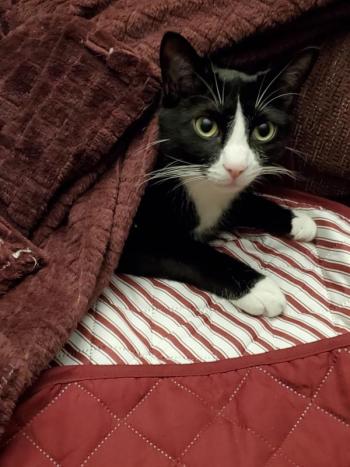 “A little over a year ago, our kitten Bruin came to us from Southern Pup in Mississippi, via 3DogsRescue in Southern Maine, as did our pup Indy back in 2016,” said Linda Lorenzen.
“A little over a year ago, our kitten Bruin came to us from Southern Pup in Mississippi, via 3DogsRescue in Southern Maine, as did our pup Indy back in 2016,” said Linda Lorenzen.
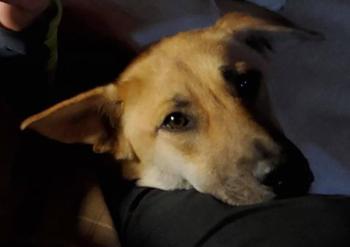 “It has been a little more than a year,” said Lisbeth Whitney. “Louise was in a kill shelter outside of Houston, Texas, along with some of her litter mates. She was on death row as a 4 month old puppy when a Texas rescue picked her up along with her litter mates and brought them to PAWS. She is the smartest, friendliest dog we have ever had and her disposition is always sunny! She has me laughing every single day.”
“It has been a little more than a year,” said Lisbeth Whitney. “Louise was in a kill shelter outside of Houston, Texas, along with some of her litter mates. She was on death row as a 4 month old puppy when a Texas rescue picked her up along with her litter mates and brought them to PAWS. She is the smartest, friendliest dog we have ever had and her disposition is always sunny! She has me laughing every single day.”
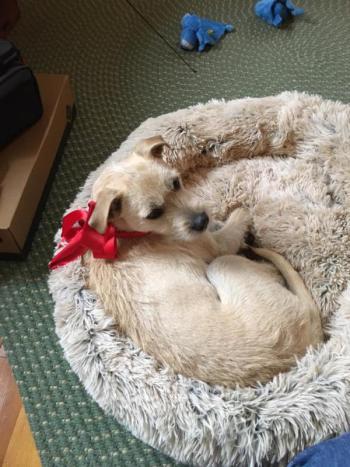 “We have Izzie,” said Anne Edmands. “She came from Texas through PAWs!”
“We have Izzie,” said Anne Edmands. “She came from Texas through PAWs!”
Numerous new canines have taken up residence in the Midcoast, stepping out smartly on walks around town, visiting local dog parks and soaking up the waterfront scenery with their new adoptive and foster families.
Many of these next generation of Midcoast dogs are rescues from southern states, where high-kill shelters are prevalent, mostly due to over population. More rescues are also traveling here from farther away, like Puerto Rico, where large populations of dogs are homeless, often mistreated and living hard lives after being abandoned on the streets.

Many of the transports to Maine are coordinated through local shelters, although some rescues are arriving via private and independent rescues.
The owner of the Lincolnville nonprofit Maine Coast Animal Rescue, Danielle Mills Blake, calls her rescue work “the Southern Connection.”

She has close relationships with the True North Animal Transport and Southern Pup Rescues in Mississippi and now that the COVID travel restrictions have eased up, monthly transports have resumed.
Blake said that many rescues are puppies and mixed breeds, but added there are also specialty breeds and senior dogs available for adoption and fostering. It depends on what is available at the time.
P.A.W.S. Animal Adoption Center in Camden collaborates with Love4Satos who have rescue “sato” or street stray dogs from the streets of Puerto Rico. According to the shelter director at P.A.W.S., so far they have received 34 dogs from the organization for adoption. More dogs arrived in April and more are expected in the upcoming weeks.


The Pope Memorial Humane Society in Thomaston has been partnering with rescue organizations in South Carolina and generally transfer in about 15-20 animals a month. Another transport arrived in April, according to the Executive Director, Tracy Sala.
Blake said that the demand for rescue dogs is never-ending.
“They are highly adoptable and lovable dogs and you’re saving the life of an animal.”
Tips for adopting rescues
Stacey Contakos, DVM, Veterinarian and owner of the Camden Hospital for Animals, shares some general tips and insights about adopting a rescue dog.
Have you been seeing many rescue dogs in your practice?

During COVID, there was a massive influx of rescue dogs. I think people felt like it was a good time to adopt. My experience has been that a lot of the dogs have been coming to Maine from out-of-state, with most transports coordinated through local shelters with about 30% have been adopted through independent rescues. I have seen a fair amount of mixed breeds with Catahoulas and Border Collie and German Shepherd mixes.

What should happen soon after adopting a rescue dog?
A new owner should get their rescue established with a veterinarian for an initial wellness exam. The owner should also bring any shot or medical records to the appointment since most rescues have already had their first distemper and kennel cough vaccines.
The Lyme vaccine should be administered since tick borne diseases are prevalent in Maine.
The new owner should also discuss any endemic problems their dog may already be treated for. Heartworm prevention should be addressed.
A high amount of the rescues we have seen at the Camden Hospital for animals have already been neutered so that hasn’t been an issue.
What is typically the transition process for rescue adoptions?
The transport can be a stressful event for some dogs so it may take time for them to get adjusted and settled into their new homes, possibly taking six to eight weeks.
Establish good routines so they can really thrive.
We are seeing more rescues who are eight, nine and 12 months old and some may be skittish and aloof based on their past experiences. Some may have had a “rough go of it” before arriving at their new homes.

Any additional advice?
I suggest enrolling the rescue dogs in obedience classes. It is a valuable time to bond with their new family members and an opportunity to build training and socialization skills.

Tips for managing your pet’s stress when you return to the workplace
As Mainers continue to receive the COVID-19 vaccine and life nears a return to pre-pandemic normalcy, pet owners around the state will be tasked with returning to work and will, once again, be altering the routine of their pets.

The pandemic and shift to working from home reduced our inclination to maintain a structured schedule, and it’s time to change that as workplaces reopen.
Pet owners should set a fixed time for different activities, including play, exercise, walking, and meals, advises Petmate.
“Ensure that the routine you set is the same one you will follow once you go back to work,” the pet products manufacturer said. “This will allow your pet to get used to the changed lifestyle.”
Stop feeding your pets at random times of the day, and instead feed them at the time you normally would feed them pre-pandemic as it fit around your work schedule.

“Take your daily walks at the time you would each morning or night,” advised Dogtopia. “You can even run through your typical morning routine: get ready, make breakfast, pack your work bag, leave the house and start your car.”
The Northeast Animal Hospital, in Florida, suggests leaving the house more frequently as your return to work nears, even if simply taking the pet to places you usually bring your furry friend such as a park, store or outdoor restaurant space.

“Don’t underestimate your pet’s ability to learn and recognize details in your daily routine,” the hospital said. “If you normally wear certain clothes for work, carry a particular bag, or give them a special treat before we leave, begin these ‘rituals’ again as we leave for our excursions.”
If planning to leave your furry friend behind while heading out for a day’s slate of activities, engage in a brief period of play and activity, the American Veterinary Medical Association recommends, to help your pet burn energy and prevent anxiety from setting in once you leave.

Janelle Metiva, a certified professional dog trainer and dog behavior specialist at Best Friends Animal Society, told the TODAY show separation anxiety can become an issue for pets.
“If the dog is used to that constant attention and suddenly it goes away, that huge, abrupt change could definitely cause them some big initial panic,” she said. “We have to do prep work now so that it’s not such an extreme transition.”

Event Date
Address
United States


